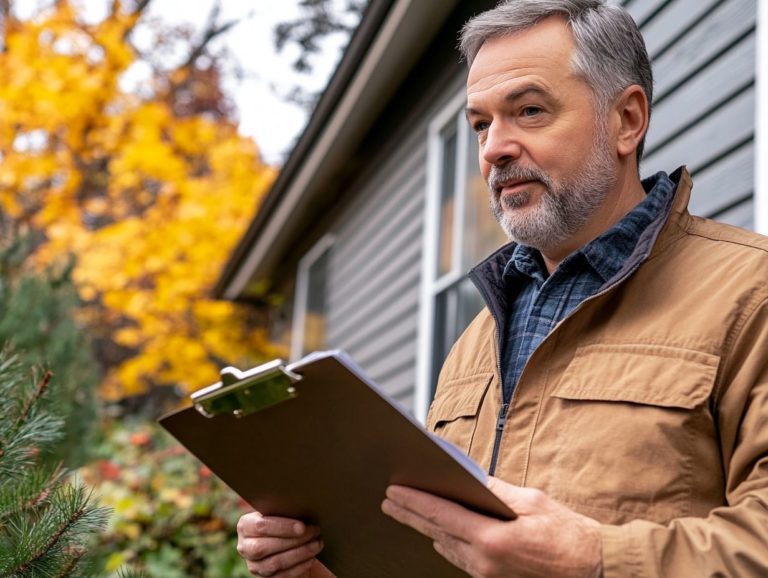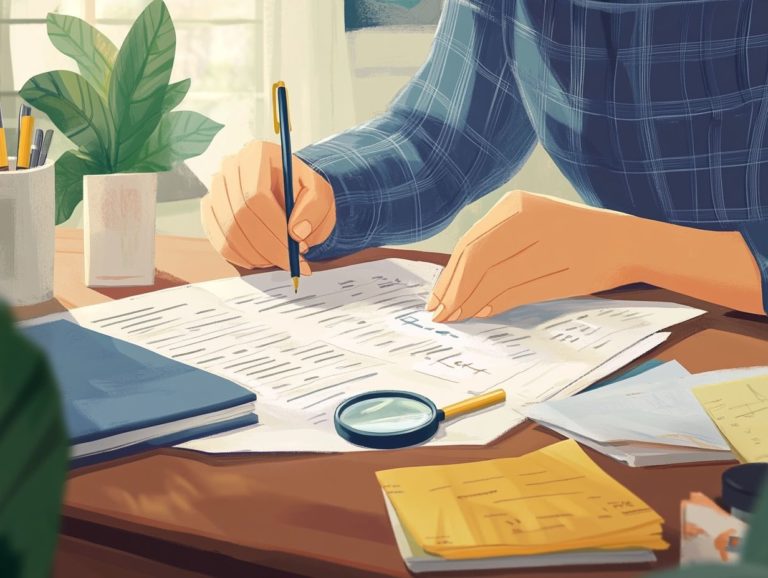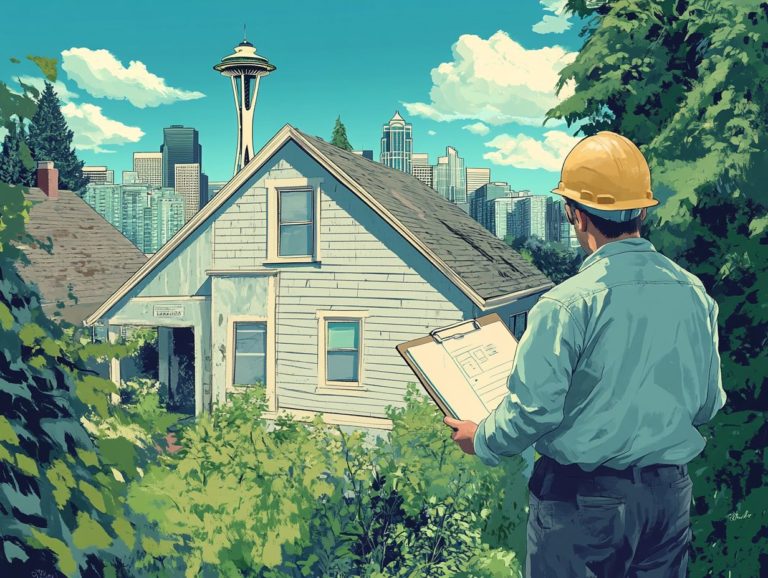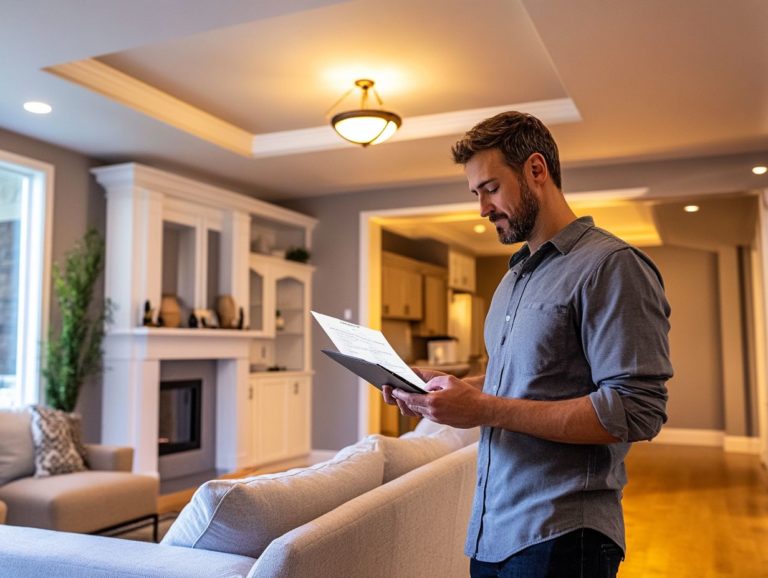How to Prepare for a Successful Home Inspection
A home inspection is an essential milestone in your buying or selling journey. It provides critical insights into the property’s condition and uncovers potential issues that may lie beneath the surface.
By grasping what a home inspection entails and how to prepare effectively, you can enhance the overall experience and reduce surprises.
This guide will detail the key steps for preparation and offer valuable tips for a successful inspection. It will also equip you with strategies to address any findings that may arise.
Whether you re a homeowner or considering a purchase, you ll discover invaluable information to help you navigate this significant process with confidence.
Contents
- Key Takeaways:
- Understanding the Purpose of a Home Inspection
- Preparing for the Inspection
- Common Issues Found During Home Inspections
- Tips for a Successful Home Inspection
- Dealing with Inspection Results
- Maintaining Your Home for Future Inspections
- Frequently Asked Questions
- What is a home inspection and why is it important to prepare for one?
- How far in advance should I start preparing for a home inspection?
- What should I do to prepare my home for an inspection?
- Do I need to be present during the home inspection?
- What should I expect during a home inspection?
- Can I make repairs before the home inspection?
Key Takeaways:
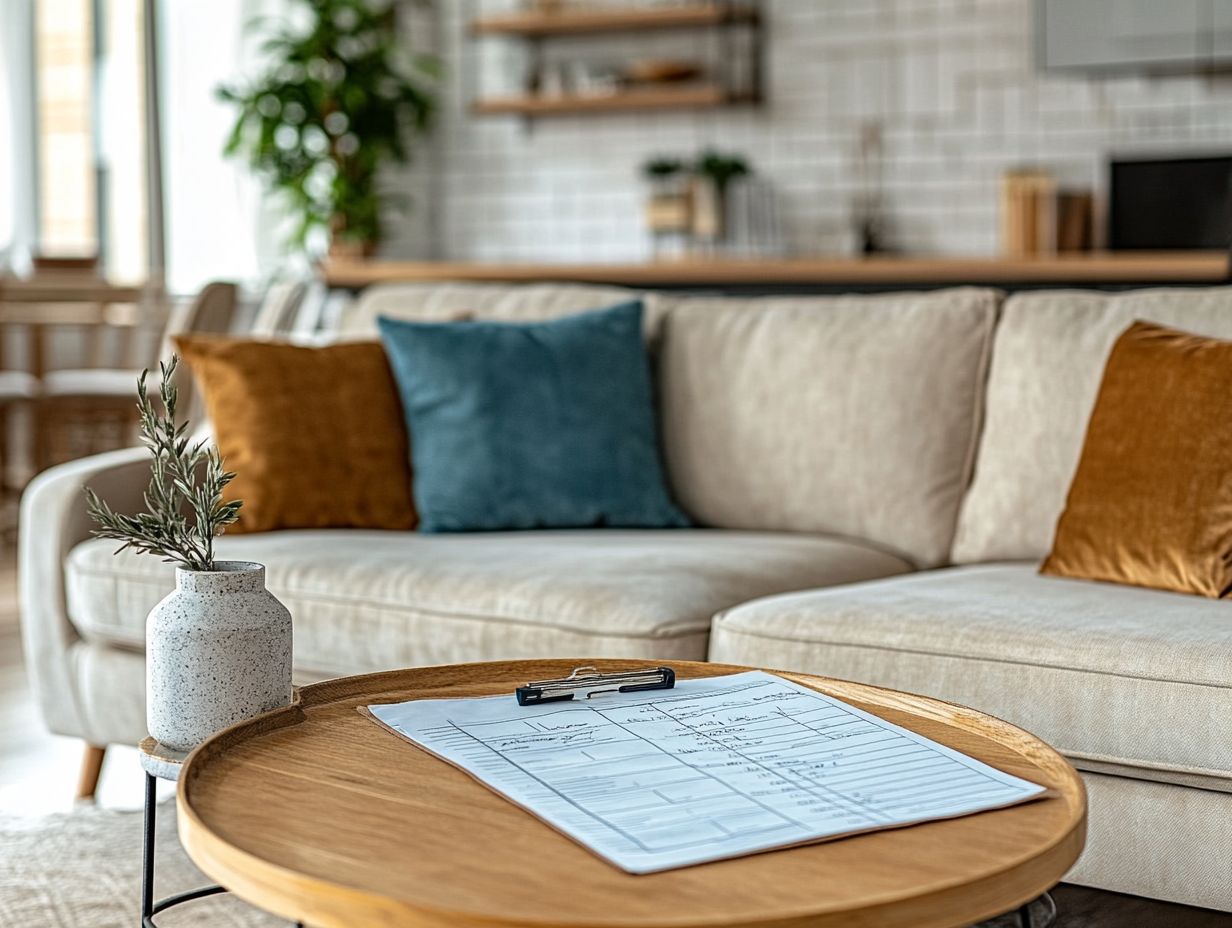
Understand the purpose and coverage of a home inspection to better prepare for the process.
Take proactive steps before the inspector arrives to ensure a smooth and successful inspection.
Address any potential problems found during the inspection to avoid major issues in the future.
Understanding the Purpose of a Home Inspection
A home inspection is an essential part of the real estate transaction process. It provides both buyers and sellers with a comprehensive understanding of the home’s condition.
This thorough check-up, typically performed by a professional home inspector, examines various structural features and systems, including electrical, plumbing, and heating, ventilation, and air conditioning (HVAC) components.
By uncovering potential issues like leaks and water damage, the inspection report equips sellers to tackle necessary repairs before a pre-listing inspection. It also allows buyers to set realistic expectations and negotiate repairs effectively.
This proactive approach can significantly impact the property’s value and the final sale price.
What a Home Inspection Covers
A home inspection encompasses a range of essential elements. This ensures every critical system and structural feature of the property is evaluated by a qualified inspector.
During this thorough process, you can expect the inspector to meticulously analyze the electrical system, checking for safety and performance. They’ll assess everything from wiring and outlets to circuit breakers, leaving no stone unturned.
The plumbing system undergoes careful scrutiny. Pipes, fixtures, and any potential leaks are examined to prevent future water damage.
Similarly, the HVAC system is assessed to verify its efficiency in heating and cooling your home. The roof is inspected for signs of wear, leaks, or damage that could lead to costly repairs down the line.
The foundation is closely examined for any cracks or stability issues. All appliances are tested to ensure they are in working order.
A comprehensive inspection checklist is invaluable in this process. It helps identify both major and minor concerns, providing you with a clear understanding of any necessary repairs before you finalize the transaction.
Preparing for the Inspection
Preparing for a home inspection is an essential step for you as a seller. Knowing how to stay calm during a home inspection can significantly influence the overall assessment and first impression you make on potential buyers.
A tidy home not only impresses but also makes it easy for the inspector to do their job. This thoughtful preparation showcases your home in its best light and improves your chances of a favorable evaluation. After the inspection, knowing what to do after a home inspection can be crucial for the next steps.
Steps to Take Before the Inspector Arrives
Before the inspector arrives, there are several essential steps you can take to prepare your home and showcase it at its finest. Don’t wait to tackle minor repairs, such as fixing leaky faucets or addressing squeaky doors, as these can greatly enhance the overall appeal of your property. For more detailed guidance, check out what to expect with a home inspection.
Keep all areas attics, basements, and garages clean and organized. This not only simplifies the inspection process but also underscores the care you ve put into maintaining your home.
Make sure to provide clear access to vital systems like electrical panels, HVAC units, and plumbing areas. This transparency reassures inspectors and potential buyers of your home s functionality.
Regular maintenance is key to preventing major issues down the line. This helps foster a positive impression during the inspection and paves the way for a smoother sale.
Common Issues Found During Home Inspections

Home inspections frequently reveal a variety of common issues that can impact the integrity and value of a property.
As a seller or buyer, it s crucial to be aware of these potential pitfalls. This knowledge helps you understand the inspection process with confidence.
Addressing Potential Problems
When issues arise during a home inspection, it s essential for you, as a seller, to tackle these repair concerns early. This proactive approach facilitates a smooth transaction process.
By addressing identified problems, you boost your property’s value. You also showcase your commitment to maintaining the home.
This action can significantly help in negotiations with buyers, highlighting your transparency and integrity.
Buyers are more likely to feel secure in their investment when they see that you have attended to necessary repairs.
Ultimately, this approach can lead to a quicker sale and reduce back-and-forth negotiations on price adjustments.
It creates a more positive experience for everyone involved in the process.
Tips for a Successful Home Inspection
A successful home inspection is essential for you as a seller. It profoundly influences the selling process and shapes the expectations of prospective buyers.
How to Make a Good Impression
Making a strong impression during a home inspection directly influences the buyer’s perception of your property’s value and condition.
A well-prepared home not only attracts potential buyers but also sets a positive tone for navigating the home inspection process.
Prioritizing cleanliness is key. Ensuring that every room sparkles and any lingering odors are eliminated creates an inviting atmosphere.
Decluttering areas like closets and countertops is crucial. This allows inspectors to navigate easily and appreciate the full potential of your space.
Optimizing your home s readiness also means providing easy access to critical areas, such as basements, attics, and utility rooms.
This level of transparency encourages a thorough evaluation, enhancing the buyer’s confidence in making an offer.
Dealing with Inspection Results
Navigating inspection results can be a challenge during the home selling process. Issues that arise may necessitate negotiation and resolution.
Face these findings head-on with a smart strategy. Ensure that you strike a balance between addressing concerns and maintaining the value of your property.
What to Do if Issues are Found

When issues arise during a home inspection, it s crucial for you as a seller to take action early in addressing repair needs to meet buyers’ expectations.
By doing this, you can preserve goodwill and potentially safeguard your sale. Start by reaching out to home inspectors for insights to clarify the severity of the reported problems.
Once you have this information, prioritize repairs based on safety, compliance, and buyer concerns.
Preparation for negotiations is key. Anticipate buyer objections and come ready with solutions, whether that means performing necessary repairs or offering concessions.
This approach tackles buyer concerns and encourages a fair resolution. It ensures a smoother transaction process.
Maintaining Your Home for Future Inspections
Maintaining your home diligently is crucial for keeping the property in excellent condition. This preparation is essential for understanding the home inspection process in the future.
These inspections can greatly influence the property’s value and its ultimate selling price, making consistent upkeep not just beneficial but essential.
Preventative Maintenance Tips
Implementing preventative maintenance tips can significantly enhance your home’s overall condition and ensure it is ready for the inspection process.
Such strategies enable you to take charge of your property and keep a keen eye on essential systems like HVAC and plumbing. By scheduling regular check-ups and swiftly addressing minor repairs, you can spot potential issues before they turn into costly disasters.
This approach ensures a smooth home inspection experience that you can feel great about, giving you peace of mind knowing your property has been meticulously maintained.
Routine maintenance boosts energy efficiency, minimizes unexpected breakdowns, and helps preserve your home’s value over time.
Frequently Asked Questions
What is a home inspection and why is it important to prepare for one?
A home inspection is a thorough examination of a property’s physical condition, including its structural, mechanical, electrical, and plumbing systems. Preparing for a home inspection is crucial because it helps identify any potential issues or defects that could affect the property’s value and safety.
How far in advance should I start preparing for a home inspection?
It is recommended to start preparing for a home inspection at least 1-2 weeks in advance. This gives you enough time to address any potential issues and make necessary repairs before what to expect during a home inspection takes place.
What should I do to prepare my home for an inspection?
To prepare for a successful home inspection, start by decluttering and cleaning your home. This helps the inspector have better access to different areas of the house. Additionally, you can learn more about the process by checking out how to prepare for a successful home inspection. Ensure all utilities are turned on and provide documentation for any recent repairs or renovations.
Do I need to be present during the home inspection?
It is not necessary for you to be present during the home inspection, but it is highly recommended. This allows you to ask questions or address concerns directly with the inspector and gives you the opportunity to see any potential issues firsthand.
What should I expect during a home inspection?
During a home inspection, the inspector examines major systems and components of the property, such as the roof, foundation, HVAC, and plumbing. They also check for safety hazards, code violations, or potential issues. The inspection typically takes 2-3 hours, depending on the size and condition of the property.
Can I make repairs before the home inspection?
Yes, you can make repairs before the home inspection. In fact, addressing any known issues beforehand saves you time, money, and potential negotiation during the sale process. Consult with your real estate agent and the inspector to determine which repairs are necessary and which can wait.



